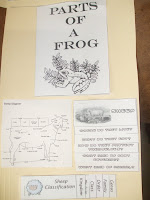 It is Christmas day and I am just finishing up creating a Zoology Notebook for my kids to work on next semester. I enjoy reading the Apologia Science books and think that the note booking aspect of the books is very kid-friendly. My kids love animals and I honestly cannot wait to get started on Zoology because I know they will just love it!
It is Christmas day and I am just finishing up creating a Zoology Notebook for my kids to work on next semester. I enjoy reading the Apologia Science books and think that the note booking aspect of the books is very kid-friendly. My kids love animals and I honestly cannot wait to get started on Zoology because I know they will just love it!We are planning a trip in January to our local Aquarium and one in May to our local Zoo. I am hoping that the trip to the Zoo will be especially meaningful after our Zoology study.

I have uploaded my Zoology Notebook to HSLaunch for anyone that could use it. Here are other good resources that could be useful:
http://www.learningtreasures.com/animal_classification.htm http://www.learningtreasures.com/make_an_animal_notebook.htm
http://www.gamequarium.org/dir/SqoolTube_Videos/Science/Animals/
http://www.jeanniefulbright.com/notebookpages.html
http://www.naturedetectives.org.uk/club/
http://www.learningtreasures.com/classification_class.htm
http://www.scribd.com/doc/6759218/African-Animal-Note-Booking
http://www.mbgnet.net/ http://www.homeschoolshare.com/animal_classification_lapbook.php
http://www.homeschoolshare.com/animal_classification_system.php
http://www.animalcorral.com/
http://www.thetoymaker.com/Toypages/49Animals/49Animals.html
http://www.sheppardsoftware.com/content/animals/kidscorner/gamesforkids.htm
http://kids.nationalgeographic.com/Animals/
http://video.nationalgeographic.com/video/player/kids/animals-pets-kids/amphibians-kids/
http://www.apples4theteacher.com/hangman.html
http://learningtreasures.com/wordpress/homeschool-helps-animal-notebooks-what-to-do-next
http://education.sdsc.edu/download/enrich/make_a_frog_book_pg_1.gif
http://www.jdp.co.uk/
http://www.sheppardsoftware.com/content/animals/kidscorner/kidscorner3.htm
http://www.albright-news.com/Lion-Lapbook.htm
http://www.zooatlanta.org/home/kids_corner

http://tagfoot.com/jimmie/bookmarks/habitats
http://www.zoobooks.com/virtualzoo.aspx?n=546584
I hope that you will enjoy these sites!














































